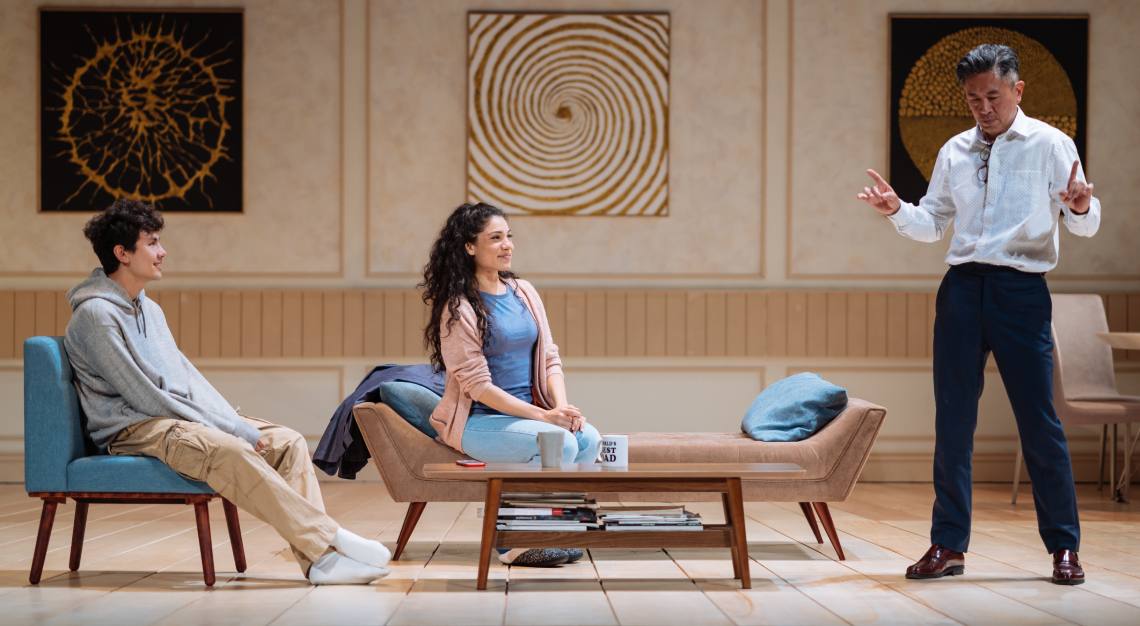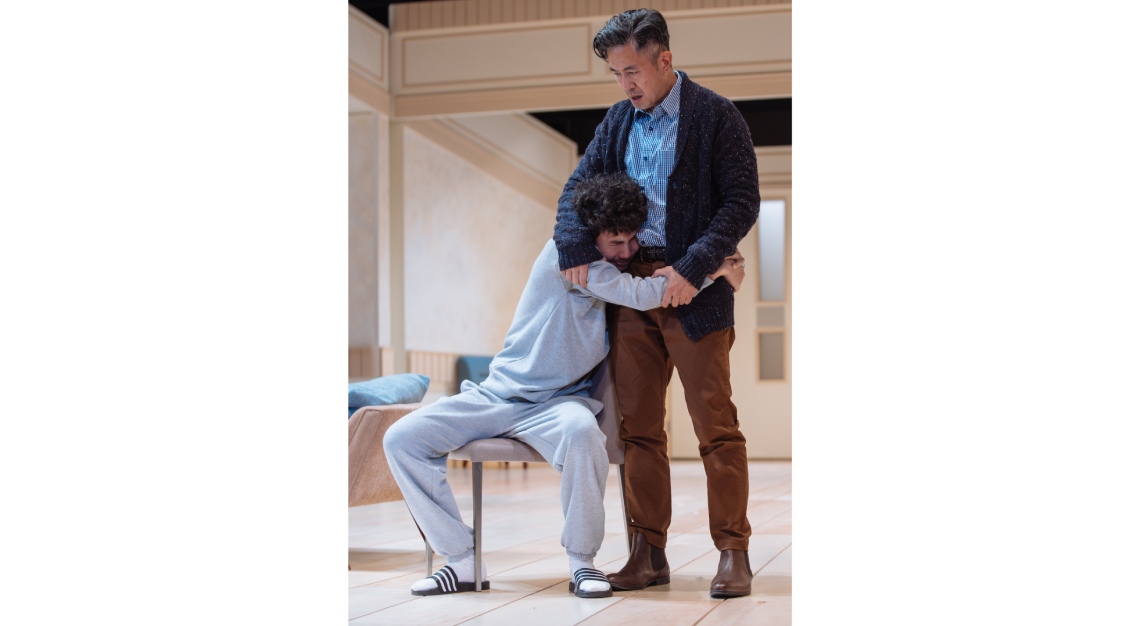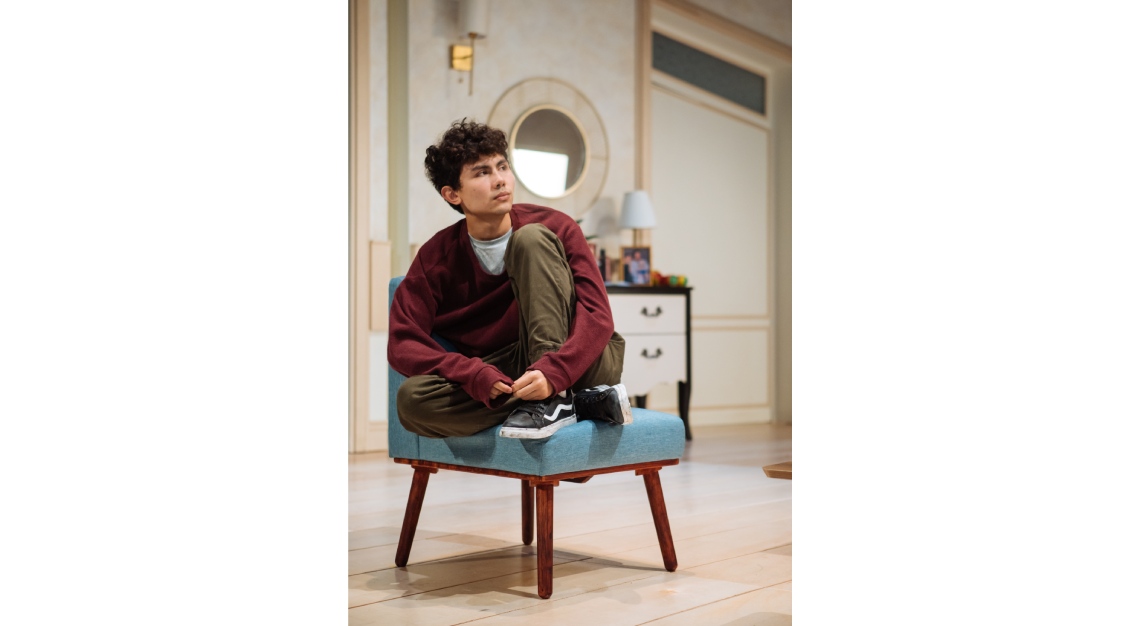Andrew Leci isn’t ‘entertained’ at all by Pangdemonium’s current production. But it has to be seen
‘Entertainment’ is such a strange word, don’t you think?
Loosely defined, it’s the action that provides enjoyment and / or amusement. Pleasure, leisure, relaxation and fun also, it seems, come into the equation. Based on this set of definitions, Pangdemonium’s production of Florian Zeller’s The Son, does not qualify as entertainment. Not on any of the counts above. It doesn’t even tick a single box.
While I am not trying to appear contrary, this is utterly commendable, and one of the reasons why I loved it.
There are occasional moments of joy; even one or two laughs, but they’re nervous ones – release-seeking and distinctly uncomfortable. As theatre practitioners will know, they’re the best kind of laughs to elicit, because when high drama is the intention, and tension is intended to be built, this response means that you’re doing your job, and you’re doing it well.

In terms of the plot, this is a well-wrought play about teenage mental health, dysfunctional families and the apparent powerlessness of parents in our modern age. Whether the three are connected is open to interpretation, as is so much of Zeller’s dramatic work that leaves as much unsaid as it says – inviting audience members to read between the lines and draw their own conclusions. Zeller described himself as someone who is “fascinated by what goes unsaid”, and The Son doesn’t disappoint in this respect.
To a certain extent, this contributes to the uncomfortable nature of the piece as much as the subject matter. We all want to know why things are as they are, and we look for clues to give us insight. As is often the case with mental health though, the answers are not easy to come by, and Zeller’s work reflects how difficult understanding can be. At certain points we see Zachary Pang’s Nicolas, behaving like a spoilt, recalcitrant child – self-indulging in his confusion and depression for no other reason than he doesn’t appear to be getting what he wants – even if he knew what he wanted in the first place.
At other times we see a human being in so much pain that it hurts, on a visceral level, and our confusion and lack of understanding as to the cause is a relevant, insightful reflection of how little we know (care to know?) about mental health itself.
I feel like being mischievous and simply referring to two of the actors and the director as ‘Pang’ – seeing as they are all Pangs and yes, they’re related. Tracie directs her husband and son in what is, perhaps, an unusual family affair, but one that adds more than a frisson to the proceedings. I kind of regret knowing that the eponymous ‘son’ is actually Adrian Pang’s progeny, but both performances are so good that it doesn’t matter whether you’re conscious of it or not, and you forget about it after a while because the onstage relationship is developed well enough to suspend the disbelief inherent in any theatrical performance.
This has to be down to some excellent direction from Tracie (sorry, first name terms only from here on in – I’ll let you know when I’m talking about a non-Pang), who seems to have mastered the art of keeping her actors under sufficient control to produce moments of dramatic pathos when their characters are not. This is quite a skill.

Zachary is mostly very good – annoying, peevish, peeved and annoyed in equal measure – and gives us moments in which to delve into a troubled mind, knowing that we’re going to come up as empty as those who even attempt to understand what a teenager with depression is going through. There are times when you want to just slap him; others when you want to give him a hug, and yet more when you want to put swaddling bands around him and put him somewhere safe in order to protect him from anything and everything. Whether the rendition was entirely deliberate or not is irrelevant. It was fascinatingly layered, and speaks to us all… in different ways.
From spoilt child to a wounded ‘dumb’ animal that simply doesn’t understand why it’s feeling so bad, Zachary’s transitions were often as arbitrary as a mood swing, and made for the kind of ‘uneven’ performance that worked perfectly for this play.
Adrian, the consummate actor (playing Pierre, father to the son), lets himself go just a tad in this performance, in a way that only assured experts can – perhaps because of who and what he is; maybe even experiencing subconscious moments of ‘there but for the grace of God go I’. While his relationship to and with Sharda Harrison’s Sofia wasn’t always the most believable, there was something about the occasional disconnection that added a level of poignancy that exacerbated the dysfunctional nature of the father / son / father’s new partner relationship. Adrian was the glue that held the piece together, and he did it admirably, but the moments when the glue became slightly less adhesive than perhaps it should have been, created some of the work’s most choice moments. If this was directorially driven, then it was genius.
Harrison (not a Pang, obviously) was almost superb, but will have to content herself with merely being excellent. Her character, Sofia, wants her life to consist of the potentially happy little triangle that exists between her, Pierre, and their newborn. Things haven’t quite panned out, because they have a depressed teenager to deal with. But the way Harrison portrays a character who isn’t getting what she wants, but is trying to be as selfless as possible in giving the important people in her life what they need, is masterful.
You sense her struggle. You feel her trying to be the good person, doing the right thing and fighting her self-interest. It’s something with which we are all too familiar. Harrison has a physicality that is always interesting to behold, because her movements often precurse her intentions – she feels before she thinks. This lent an engrossing dynamic to all her interactions with Nicolas and Pierre, and enriched the piece immeasurably.

Shona Benson (another non-Pang) as Anne, the mother, took on a difficult role because I’m not sure that the playwright had anything particular in mind when serving up the character. Her lines could have been delivered in so many different ways, depending on how the actor and director chose to portray her. Benson’s version was intriguing – verging on the startlingly subtle; leaning towards misguided nuance – all based on interpretation. We’re supposed to feel her love for her son, and her determination that, irrespective of her personal agenda, what’s best for Nicolas is the only thing on her mind. We felt this for most of the time, I think, and then at others we were left feeling that the abnegation of responsibility was the preferred by-product / outcome. Just perfect.
An engaged member of the audience doesn’t want to be dictated to. This duality; this confusion; this opportunity for interpretation infuses the piece at so many points, and makes it a compelling and riveting watch. If it were a book, you wouldn’t be able to put it down. You’ll change your mind about how you feel towards a character (every character) a dozen times within the space of 120 minutes, and that’s just the way, I would suggest, Zeller would have wanted it.
Read between the lines; think about things; try to understand that which cannot be understood, but make an effort anyway because it will be worthwhile.
Is this an entertaining production? Hell no. Not if we’re sticking to the earlier definition. It’s exhausting, harrowing and possibly even traumatic – depending perhaps on one’s own family background as well as what we know (or think we know) about mental health.
But it is stimulating, brilliantly written (superbly translated from French by Christopher Hampton – one of the world’s greatest living playwrights, in my opinion, and now a dramaturge and mentor to Zeller), expertly acted and beautifully produced. The set is without peer (coruscating in its conception – audience at the front, ever-decreasing rectangles to upstage, depicting the non-existent confluence of the wider world into the dead-end space of the human psyche). Confusing? Hell yes.
Theatre doesn’t have to be entertaining, but it does have to make you think, and feel. The Son, I feel, achieves most if not all of what it sets out to do.
This is a play and a production that simply has to be seen.






